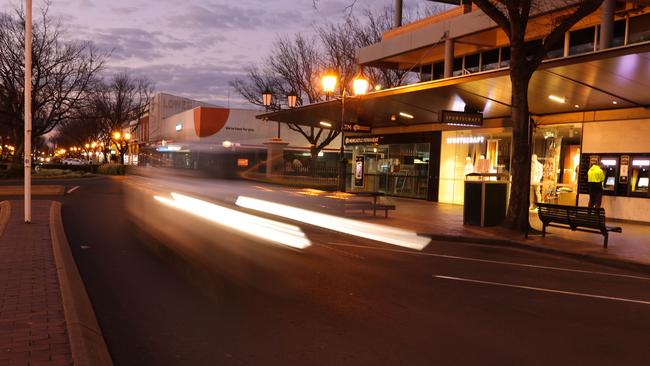NSW Central West pays the price of dealer’s Sydney dash for drugs
The man who brought the pandemic to the NSW Central West – an outbreak that has grown to 169 – was a dealer returning from Sydney with a stash of drugs, sources say.

Patient zero had form. It is believed the man who brought the pandemic to the NSW Central West – an outbreak that has grown to 169 – was a dealer returning from Sydney with a stash of drugs.
According to several sources in Dubbo, the man travelled to the Sydney suburb of Mount Druitt to pick up a package of amphetamines – where he was also infected with the virus – and that he then returned to Dubbo.
Early last week he was arrested in Dubbo on an outstanding warrant and taken to Bathurst jail, where he was held overnight. He was released the next morning and travelled 649km to Walgett on Monday, August 9, apparently stopping briefly at Dubbo along the way.
While he was in Bathurst jail he underwent a regulation Covid-19 test. The positive result was not known until after he was released from jail.
“If he’d not been arrested and tested things could be much, much worse than they are now,” a source in Dubbo said. “He could have been out in the community for many more days before it was discovered.”
As it is, things are bad enough. This one case has led to more than 60 children being infected and locked down regional NSW as cases spread west to Broken Hill and north to Bourke. Western NSW Local Health District chief executive Scott McLachlan said the majority of the new cases were infectious while in the community. However, as contract tracers do their work, the number of positive cases who were infectious in the community is declining each day.
By Thursday Dubbo Hospital had for the first time moved a Covid-19 patient to intensive care. Authorities fear it will get worse, much worse, before numbers decline. There are a total of 18 ventilated beds in Dubbo.
The majority of those infected in the western NSW outbreak are in the Aboriginal community in Dubbo. The strain has now spread to some of the state’s most vulnerable Indigenous communities, including Brewarrina, where kidney disease is so prevalent among the town’s 800 Aboriginal residents that 10 dialysis machines run 24 hours a day, seven days a week.
Contact tracers in Western Australia, where the only Covid-19 cases are returned travellers in hotel quarantine, have been working remotely to help track and isolate contacts of known cases in the western NSW outbreak. The emergency response includes a focus on vaccinating Aboriginal people in particular. This is because the commonwealth knows Aboriginal and Torres Strait Islander people across Australia are far less likely to have had even one shot. Curiously, Dubbo still did not have a walk-in vaccination clinic on Thursday, eight days after authorities knew an infectious person had been moving through NSW’s west.
Instead, NSW Health has been persisting with a bookings system in Dubbo, the town with 126 of the outbreak’s 169 cases.
To the relief of many, the city’s first walk-in Covid-19 vaccination clinic will open on Saturday at Pioneer Park. No bookings will be necessary.
“I am very surprised they are only just getting to that,” said Wiradjuri woman Grace Toomey, who represents Dubbo and surrounds on the NSW Aboriginal Land Council.
Ms Toomey is due to have her first Covid-19 vaccination in Dubbo next week. It is a booking she made weeks ago and she intends to keep it “so someone else can have a chance to get a walk-in vaccination”.
Her concern is for families struggling in the lockdown. It is not easy to entertain kids indoors for weeks on end in small, overcrowded homes, she said. ADF care packages will help those isolating for 14 days but unable to afford to buy 14 days of groceries at once.
After a frustrating period of inertia, the vaccine rollout to Aboriginal and Torres Strait Islander people is gathering speed.
On Monday, 29.3 per cent of Indigenous Australians over the age of 16 had received at least one Covid-19 vaccination and 14.9 per cent were fully vaccinated. By the end of Wednesday, 31 per cent of Indigenous people over 16 years had received their first shot and more than 94,116 Indigenous people – 16.2 per cent of the Indigenous population over 16 – had received a second. In addition, more than 700 Indigenous people aged 12-15 had received their first dose.
In the general population the numbers of vaccinated people is also lifting. On Thursday, more than half of all Australians over 16 had received one shot and 28.2 per cent were fully vaccinated.
Why have so few Indigenous people had shots when they were supposedly prioritised in the rollout that began in March? Ms Toomey says vaccine hesitancy among Indigenous people gets the blame but it was really about shifting advice about who should have AstraZeneca and a dearth of Pfizer in the regions.
“There was just no access to Pfizer after those messages came out about who can and cannot have AstraZeneca,” she said. “It was confusing when the authorities were saying you can’t have it, now you can all have it. And that is all that was available out here.”







To join the conversation, please log in. Don't have an account? Register
Join the conversation, you are commenting as Logout